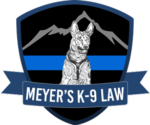Free air sniffs of people are problematic. Being more intrusive, K9 sniffs of a person are considered, at least by the Federal Ninth Circuit Court of Appeal, to be a search controlled by the Fourth Amendment and therefore require probable cause prior to the sniff. B.C. v. Plumas (9th Cir. 1999) 192 F.3rd 1260. In the case of students in schools, because of the diminished right to privacy in schools, using a drug-sniffing dog to do sniffs of a student, being more intrusive than a search of student property or locker, are considered to be a search and controlled by the Fourth Amendment, but only requires a finding of a “reasonable suspicion” prior to sniffing a student. See B.C. v. Plumas (9th Cir. 1999) 192 F.3d 1260; random and suspicion-less drug sniff search of students held to be unreasonable under the circumstances because there was no indication (reasonable suspicion) that would support a sniff.
An alert by a K9 without an order to conduct a sniff has been held to be constitutional but only in very limited circumstances. In United States v. Reyes (5th Cir. 2003) 349 F.3d 219, after alerting to the cargo area of a bus during a border search, K9 boarded through the open door of a bus its own and appeared to alert in the passenger compartment. Passengers were instructed to leave the bus so K9 could sniff. K9 then alerted to suspect’s person as he walked by, about 4 to 5 feet away. The court held that this was not a violation of the person’s constitutional rights as it was minimally intrusive. The court also noted this was a border inspection and therefore, Fourth Amendment protections are relaxed.
Finally, if your K9 is dual purpose, it is probably too dangerous to have that K9 sniff persons. Meyer’s Police K9 Training teaches that a dual purpose K9 should not sniff persons for that reason.
